|
Books Should Be Free Loyal Books Free Public Domain Audiobooks & eBook Downloads |
|
|
Books Should Be Free Loyal Books Free Public Domain Audiobooks & eBook Downloads |
|
Literature |
|---|
|
Book type:
Sort by:
View by:
|
By: Frederick Marryat (1792-1848) | |
|---|---|
 Olla Podrida
Olla Podrida
| |
 Japhet in Search of a Father
Japhet in Search of a Father
| |
 Japhet, in Search of a Father
Japhet, in Search of a Father
| |
 Olla Podrida
Olla Podrida
| |
 The Poacher Joseph Rushbrook
The Poacher Joseph Rushbrook
| |
 The Privateer's-Man One hundred Years Ago
The Privateer's-Man One hundred Years Ago
| |
 Naval Officer, or Scenes in the Life and Adventures of Frank Mildmay
Naval Officer, or Scenes in the Life and Adventures of Frank Mildmay
Marryat was a midshipman under Captain Cochrane and this, his first naval adventure, is considered to be a highly autobiographical telling of his adventures with one of Britain's most famous and daring naval captains. | |
 The Little Savage
The Little Savage
| |
 Newton Forster
Newton Forster
| |
 Snarleyyow or The Dog Fiend
Snarleyyow or The Dog Fiend
| |
By: Frederick O. Bartlett (1876-1945) | |
|---|---|
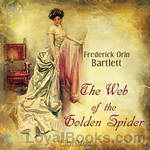 The Web of the Golden Spider
The Web of the Golden Spider
The Web of the Golden Spider is a tale of mystery, intrigue and adventure that begins in the city, progresses to a mutinous open sea voyage, eventually leading to the remotest areas on the slopes of the Andes of South America. Wilson, our hero, finds himself in the midst of a battle between a deposed queen and revolutionists who have banded together in an effort to bring their country together as a republic. Wilson, although torn between helping mercenaries, freedom fighters and revolutionaries, is more concerned with the rescuing of the girl he has fallen in love with, but who has been snatched from him by a mysterious priest... | |
By: Frederick Orin Bartlett (1876-1945) | |
|---|---|
 The Seventh Noon
The Seventh Noon
| |
 The Triflers
The Triflers
| |
By: Frederick Peterson (1859-1938) | |
|---|---|
 The Flutter of the Goldleaf; and Other Plays
The Flutter of the Goldleaf; and Other Plays
| |
By: Frederick R. (Frederick Ritchie) Bechdolt (1874-1950) | |
|---|---|
 When the West Was Young
When the West Was Young
| |
By: Frederick R. Toombs (1879-) | |
|---|---|
 A Gentleman from Mississippi
A Gentleman from Mississippi
| |
By: Frederick S. (Frederick Samuel) Boas (1862-1957) | |
|---|---|
 The Tragedy Of Caesar's Revenge
The Tragedy Of Caesar's Revenge
| |
By: Frederick S. Brereton (1872-) | |
|---|---|
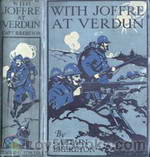 With Joffre at Verdun A Story of the Western Front
With Joffre at Verdun A Story of the Western Front
| |
By: Frederick Vining Fisher (1866-) | |
|---|---|
 The Transformation of Job A Tale of the High Sierras
The Transformation of Job A Tale of the High Sierras
| |
By: Frederick W. (Frederick William) Thomas (1806-1866) | |
|---|---|
 The Emigrant or Reflections While Descending the Ohio
The Emigrant or Reflections While Descending the Ohio
| |
By: Frederik Pohl | |
|---|---|
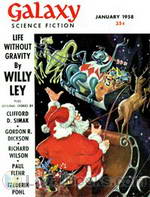 The Knights of Arthur
The Knights of Arthur
Sailors Sam Dunlap and Arthur check in to a New York hotel to await their mate Vern Engdahl when a girl shows up proposing to purchase Arthur. They need guys like Arthur to help run the city, and the fact that he fits in a small suitcase is even better. – The Knights of Arthur was first published in the January 1958 edition of Galaxy Science Fiction magazine. | |
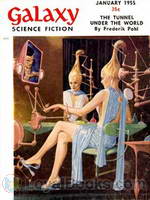 Tunnel Under The World
Tunnel Under The World
This famous Pohl story explores cybernetic robots and implanted personalities in a way that certainly expanded my way of looking at reality. Is that wall really real? or is it just kinda, sorta real? And who am I? The protagonist, Guy Burckhardt, wakes up screaming from a horrible dream of explosions, searing fire, choking gas and other terrible ways to die. But he wakes up so it must have been just a bad nightmare, right? To find out that piece of information you will need to listen to this inventive and scary story. | |
 The Day of the Boomer Dukes
The Day of the Boomer Dukes
| |
 The Hated
The Hated
| |
 Pythias
Pythias
| |
By: Frederika Richardson Macdonald | |
|---|---|
 Secret of Charlotte Brontë
Secret of Charlotte Brontë
Twenty years ago, now, I attempted (but was not especially successful in the task) to establish upon the personal knowledge that my own residence as a pupil in the historical Pensionnat in the Rue d'Isabelle, at Bruxelles gave me of the facts of Charlotte Brontë's relationships to Monsieur and Madame Heger, right impressions about the experiences and emotions she underwent between 1842 and 1846, and that supply the key and clue to the right interpretation of her genius. Every opinion I then ventured... | |
By: Fredric Brown (1906-1972) | |
|---|---|
 Earthmen Bearing Gifts
Earthmen Bearing Gifts
| |
 Two Timer
Two Timer
| |
 Keep Out
Keep Out
| |
 Hall of Mirrors
Hall of Mirrors
| |
By: Fredrika Bremer (1801-1865) | |
|---|---|
 The Home Or, Life in Sweden
The Home Or, Life in Sweden
| |
 Strife and Peace
Strife and Peace
| |
By: Freeman E. (Freeman Edwin) Miller (1864-1951) | |
|---|---|
 Oklahoma Sunshine
Oklahoma Sunshine
| |
By: Friedrich de La Motte-Fouqué (1777-1843) | |
|---|---|
 Undine
Undine
Undine is a novel by Friedrich de la Motte Fouqué concerning Undine, a water spirit who marries a Knight named Huldebrand in order to gain a soul. It is an early German romance, which has been translated into English and other languages. The novel served as inspiration for two operas in the romantic style by Ernst Theodor Amadeus Hoffmann and Albert Lortzing, respectively, and two ballets: the nineteenth century Ondine and the twentieth century Undine. An edition of the book was illustrated by Arthur Rackham... | |
By: Friedrich Heinrich Karl Freiherr de La Motte-Fouqué (1777-1843) | |
|---|---|
 Aslauga's Knight
Aslauga's Knight
| |
 The Two Captains
The Two Captains
| |
By: Friedrich Maximilian Klinger (1752-1831) | |
|---|---|
 Faustus his Life, Death, and Doom
Faustus his Life, Death, and Doom
| |
By: Friedrich Nietzsche (1844-1900) | |
|---|---|
 Case of Wagner / Nietzsche Contra Wagner / Selected Aphorisms
Case of Wagner / Nietzsche Contra Wagner / Selected Aphorisms
A collection of three of Nietzsche's writings concerning the music of Wagner. In particular, he relates Wagner's music as degenerate, unrefined and unintelligent and relates it to a gradually degenerating German culture and society. The translator provides a detailed introduction. | |
 Birth of Tragedy
Birth of Tragedy
In this famous early work of German philosopher Friedrich Nietzsche, he investigates the artistic characteristics of Apollonian and Dionysian characteristics in Greek art, specifically in Greek tragedy as it evolved. Then he applies his conclusions about Greek tragedy to the state of modern art, especially modern German art and specifically to the operas of Richard Wagner. | |
By: Friedrich Schiller (1759-1805) | |
|---|---|
 Mary Stuart
Mary Stuart
Schiller's tragedy depicts the final days of Mary, Queen of Scots, who has been imprisoned by her cousin, Queen Elizabeth I, because of her potential claim on the English throne. The action of the play revolves around an attempt to rescue Mary from prison and Elizabeth's indecision over whether or not to have her executed. The 1801 translation is by Joseph Mellish, a friend of Schiller's. | |
 Aesthetical Essays of Frederich Schiller
Aesthetical Essays of Frederich Schiller
| |
 The Robbers
The Robbers
| |
 Love and Intrigue
Love and Intrigue
Ferdinand is an army major and son of President von Walter, a high-ranking noble in a German duke's court, while Luise Miller is the daughter of a middle-class musician. The couple fall in love with each other, but both their fathers tell them to end their affair. The President instead wants to expand his own influence by marrying Ferdinand to Lady Milford, the duke's mistress, but Ferdinand rebels against his father's plan and tries to persuade Luise to elope with him. | |
 Don Carlos
Don Carlos
| |
 The Poems of Schiller — Third period
The Poems of Schiller — Third period
| |
 Maid of Orleans
Maid of Orleans
| |
 Wilhelm Tell
Wilhelm Tell
| |
 The Death of Wallenstein
The Death of Wallenstein
| |
 The Poems of Schiller — First period
The Poems of Schiller — First period
| |
 Philosophical Letters of Frederich Schiller
Philosophical Letters of Frederich Schiller
| |
 The Ghost-Seer; or the Apparitionist; and Sport of Destiny
The Ghost-Seer; or the Apparitionist; and Sport of Destiny
| |
 The Bride of Messina, and On the Use of the Chorus in Tragedy
The Bride of Messina, and On the Use of the Chorus in Tragedy
| |
 The Piccolomini
The Piccolomini
| |
 The Poems of Schiller — Second period
The Poems of Schiller — Second period
| |
 The Works of Frederich Schiller
The Works of Frederich Schiller
| |
 Camp of Wallenstein
Camp of Wallenstein
This is the first play of Friedrich Schiller's Wallenstein Trilogy. Set in a Bohemian camp during the Thirty Years War, it introduces the major characters of the rest of the trilogy, like Albrecht von Wallenstein and Max Piccolomini, from their subordinates' point of view. | |
 Demetrius
Demetrius
| |
 Turandot: The Chinese Sphinx
Turandot: The Chinese Sphinx
| |
 Fiesco; or, the Genoese Conspiracy
Fiesco; or, the Genoese Conspiracy
| |
By: Fritz Leiber (1910-1992) | |
|---|---|
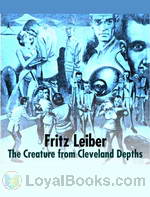 The Creature from Cleveland Depths
The Creature from Cleveland Depths
“The Creature from Cleveland Depths” also known as “The Lone Wolf” tells the story of a writer and his wife who refuse to move below-ground after the cold-war gets hot. The underground society discovers a decline in their ability to creatively innovate, and must consult with surface dwellers to develop products that satiate the needs of a people living like moles. But the latest product to result from this alliance, “The Tickler” has frightening implications that only our heroes seem to notice. – This story appeared in the December, 1962 issue of “Galaxy” magazine. | |
 The Night of the Long Knives
The Night of the Long Knives
"I was one hundred miles from Nowhere—and I mean that literally—when I spotted this girl out of the corner of my eye. I'd been keeping an extra lookout because I still expected the other undead bugger left over from the murder party at Nowhere to be stalking me." In a Post apocalyptic world, the few people left must be strong. And must not hesitate to kill. Of course, killing another Deathlander was one of the chief pleasures and urges of all the solitary wanders in this vast wasteland. Kill and kill again. But this other was a girl and that brought up the second great urge: sex. Which was it to be today? Perhaps both? | |
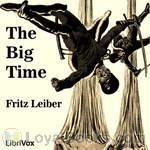 The Big Time
The Big Time
A classic locked room mystery, in a not-so-classic setting. (Intro by Karen Savage) | |
 No Great Magic
No Great Magic
They were a traveling group of Shakespearean players; perfectly harmless, right? Wrong. For one thing, why did they have spacemen costumes in their wardrobes, right next to caveman ones? Why was the girl in charge of backstage suffering from amnesia and agoraphobia? No Great Magic is needed to perform the plays they put on, but sometimes great science. No matter where, or when. | |
 What's He Doing in There?
What's He Doing in There?
| |
 Three Science Fiction Stories by Fritz Leiber
Three Science Fiction Stories by Fritz Leiber
The Moon is Green, Bread Overhead and What's He Doing In There?! Three of the best known and loved Science Fiction short stories by the wonderful Fritz Lieber. Always tongue in cheek, and always with a funny twist, Leiber deftly shows how humans will adapt to or mess up the future. In ways that only humans can. | |
 Bread Overhead
Bread Overhead
| |
By: Fyodor Dostoyevsky (1821-1881) | |
|---|---|
 Crime and Punishment
Crime and Punishment
A mysterious crime is being plotted in a tiny garret above a dilapidated apartment building in St Petersburg in Russia. The plotter, Rodion Raskolinikov, is a poor student who has delusions of ridding the world of “worthless vermin” and counter balancing these crimes with good deeds. He commits a murder to test his own theories and prove that crime comes naturally to the human species. Crime and Punishment is a path-breaking novel of ideas that changed the course of novel writing in the 20th century... | |
 The Brothers Karamazov
The Brothers Karamazov
Set in 19th century Russia, The Brothers Karamazov (Russian: Братья Карамазовы) is the last novel written by the illustrious author Fyodor Dostoyevsky who died a few months before the book's publication. The deeply philosophical and passionate novel tells the story of Fyodor Karamazov, an immoral debauch whose sole aim in life is the acquisition of wealth. Twice married, he has three sons whose welfare and upbringing, he cares nothing about. At the beginning of the story, Dimitri Karamazov, the eldest son who is now a twenty-eight year old war veteran, returns to his home town to claim the inheritance left to him by his dead mother... | |
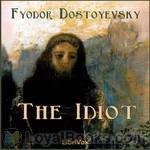 The Idiot
The Idiot
The extraordinary child-adult Prince Myshkin, confined for several years in a Swiss sanatorium suffering from severe epilepsy, returns to Russia to claim his inheritance and to find a place in healthy human society.The teeming St Petersburg community he enters is far from receptive to an innocent like himself, despite some early successes and relentless pursuit by grotesque fortune-hunters. His naive gaucheries give rise to extreme reactions among his new acquaintance, ranging from anguished protectiveness to mockery and contempt... | |
 Double: A Petersburg Poem (Version 2)
Double: A Petersburg Poem (Version 2)
In this classic novella, the life of a drab office clerk named Golyadkin begins to be haunted by his "doppelgänger," a man identical to him possessing all the charm and charisma Golyadkin lacks. This double shows up over and over again, succeeding in the things Golyadkin has failed to do throughout his life. As this double infiltrates himself more and more into Golyadkin's life, the reader is left wondering who he is and what his purposes might be. - Summary by Magda Wilde | |
 Landlady
Landlady
Everything changed when Ordynov, a secluded young thinker, stepped out of his old lodgings in search of another corner. The ailing landlord watched from a distance, while the beautiful landlady came close... A tale of love, murder, and sorcery, The Landlady is one of a kind among Fyodor Dostoevsky's works. Written at the age of 26 before he was sent to Siberia, preceded only by The Double and Poor Folk, this novella draws inspiration from Russian folklore as well as stories by Pushkin and Gogol. It anticipates some of the writer's most important ideas to be developed in his later writings. | |
 House of the Dead
House of the Dead
The House of the Dead is a novel published in 1861 by Russian author Fyodor Dostoyevsky, which portrays the life of convicts in a Siberian prison camp. Dostoyevsky himself spent four years in exile in such a camp following his conviction for involvement in the Petrashevsky Circle. This experience allowed him to describe with great authenticity the conditions of prison life and the characters of the convicts. The narrator, Aleksandr Petrovich Goryanchikov, has been sentenced to penalty deportation to Siberia and ten years of hard labour... | |
 Crocodile
Crocodile
Ivan Matveich, the most ordinary person you might hope to meet, is swallowed alive by a crocodile at a sideshow. Finding life inside the belly of the beast quite comfortable, he makes a home for himself there. His disquisitions on the state of the world from inside the crocodile make him quite a name for himself; while all the while the discussion rages outside as to whether the beast is going to be cut open to release him or not, its value as a sideshow attraction having massively increased owing to the presence of the human voice buried inside it. One of Jorge Luis Borges' seven most favourite stories. - Summary by Tony Addison | |
By: G. C. Edmondson (1922-1995) | |
|---|---|
 Blessed Are the Meek
Blessed Are the Meek
| |
By: G. C. Huddleston | |
|---|---|
 Bluebell A Novel
Bluebell A Novel
| |
By: G. E. Mitton | |
|---|---|
 The Children's Book of Stars
The Children's Book of Stars
| |
By: G. Firth Scott | |
|---|---|
 Colonial Born A tale of the Queensland bush
Colonial Born A tale of the Queensland bush
| |
 The Rider of Waroona
The Rider of Waroona
| |
By: G. H. (George Herbert) Mair (1887-1926) | |
|---|---|
 English Literature: Modern
English Literature: Modern
| |
By: G. J. (George John) Whyte-Melville (1821-1878) | |
|---|---|
 Kate Coventry An Autobiography
Kate Coventry An Autobiography
| |
By: G. K. Chesterton (1874-1936) | |
|---|---|
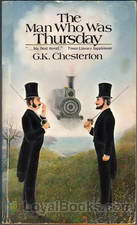 The Man Who was Thursday
The Man Who was Thursday
Two poets in a London park at sunset, debating on the attributes of poetry and whether it's really a metaphor for anarchy. A group that meets in secret, planning to overthrow the world order. Disguises and deceptions, ideals and ideology. A medley of themes and genres makes this a great read for anyone who's a fan of Chesterton and his iconic Father Brown. The Man Who Was Thursday includes Chesterton's favorite theme of Christianity with touches of delightful humor to enliven the twists and turns that abound throughout the book... | |
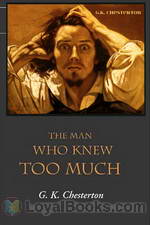 The Man Who Knew Too Much
The Man Who Knew Too Much
Robbery, murder and treason. Strange happenings in quiet English villages. A book critic who happens to find a corpse with its head crushed, an Irish freedom fighter framed for a crime, the disappearance of a valuable coin, a strange dispute over a property claim and a host of other intriguing situations make up the contents of G K Chesterton's collection of short stories The Man Who Knew Too Much. For fans of Chesterton's immortal clerical sleuth, Father Brown, these stories are equally delightful and intricately wrought... | |
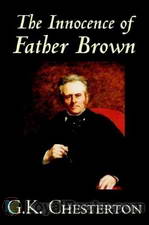 The Innocence of Father Brown
The Innocence of Father Brown
A Chief of Police hosts a dinner party for an American millionaire wishing to will his entire fortune to the Church of France. Jewels that have been stolen and recovered so many times that they're known colloquially by thieves as The Flying Stars. A murder committed by an invisible man. These and many others are the mysteries that are presented to the lovable, bumbling, stumpy Man of God, Father Brown. The Innocence of Father Brown, by G.K. Chesterton is a collection of eleven stories which marks the debut of this most unusual detective... | |
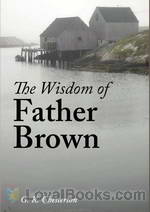 The Wisdom of Father Brown
The Wisdom of Father Brown
The Wisdom of Father Brown explores many characters and fascinating themes such as the following. An eminent criminologist is persuaded by the mild yet persistent Father Brown to sort out a family matter. Also, a Tuscan poet fancies himself as the King of Thieves. A famous French philosopher and atheist holds the key to a new invention called “Noiseless Powder.” A corpse is discovered in a dark passage backstage at London's Adelphi Theater. Finally there is Psychometric testing of criminals in Chicago... | |
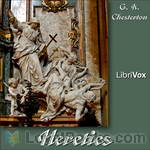 Heretics
Heretics
The Author Gilbert Keith Chesterton was born in London, England on the 29th of May, 1874. Though he considered himself a mere “rollicking journalist,” he was actually a prolific and gifted writer in virtually every area of literature. A man of strong opinions and enormously talented at defending them, his exuberant personality nevertheless allowed him to maintain warm friendships with people–such as George Bernard Shaw and H. G. Wells–with whom he vehemently disagreed. Chesterton had no difficulty standing up for what he believed... | |
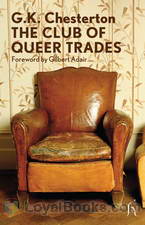 The Club of Queer Trades
The Club of Queer Trades
A collection of six wonderfully quirky detective stories, featuring the ‘mystic’ former judge Basil Grant. Each story reveals a practitioner of an entirely new profession, and member of the Club of Queer Trades. | |
 Eugenics and Other Evils
Eugenics and Other Evils
Most Eugenists are Euphemists. I mean merely that short words startle them, while long words soothe them. And they are utterly incapable of translating the one into the other, however obviously they mean the same thing. Say to them “The persuasive and even coercive powers of the citizen should enable him to make sure that the burden of longevity in the previous generation does not become disproportionate and intolerable, especially to the females”; say this to them and they will sway slightly to and fro like babies sent to sleep in cradles. Say to them “Murder your mother,” and they sit up quite suddenly. Yet the two sentences, in cold logic, are exactly the same.” | |
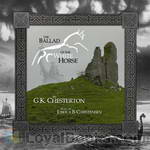 The Ballad of the White Horse
The Ballad of the White Horse
An English epic poem that follows the exploits of Alfred the Great in his defense of Christian civilization in England from the heathen nihilism of the North. Following a string of defeats at the hands of the invading Danes, a vision from heaven in the river island of Athelney fills Alfred with joy and hope. Though it gives no promise of victory in the coming struggle, it inspires him to rally his chieftains for a last stand against the invading hordes. His adventures lead throughout the country... | |
 Alarms and Discursions
Alarms and Discursions
Gilbert Keith Chesterton was an influential English writer of the early 20th century. His prolific and diverse output included journalism, philosophy, poetry, biography, Christian apologetics, fantasy, and detective fiction. Chesterton has been called the “prince of paradox.” He wrote in an off-hand, whimsical prose studded with startling formulations. Chesterton wrote about 4000 essays on various subjects, and “Ararms and Discursions is one of his collections. | |
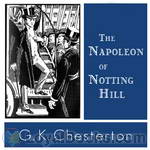 The Napoleon of Notting Hill
The Napoleon of Notting Hill
While the novel is humorous (one instance has the King sitting on top of an omnibus and speaking to it as to a horse: “Forward, my beauty, my Arab,” he said, patting the omnibus encouragingly, “fleetest of all thy bounding tribe”), it is also an adventure story: Chesterton is not afraid to let blood be drawn in his battles, fought with sword and halberd in the London streets, and Wayne thinks up a few ingenious strategies; and, finally, the novel is philosophical, considering the value of one man’s actions and the virtue of respect for one’s enemies. | |
 The Ball and the Cross
The Ball and the Cross
The Ball and the Cross is G. K. Chesterton's third novel. In the introduction Martin Gardner notes that it is a "mixture of fantasy, farce and theology." Gardner continues: "Evan MacIan is a tall, dark-haired, blue-eyed Scottish Highlander and a devout Roman Catholic.... James Turnbull is a short, red-haired, gray-eyed Scottish Lowlander and a devout but naive atheist.... The two meet when MacIan smashes the window of the street office where Turnbull publishes an atheist journal. This act of rage occurs when MacIan sees posted on the shop's window a sheet that blasphemes the Virgin Mary, presumably implying she was an adulteress who gave birth to an illegitimate Jesus... | |
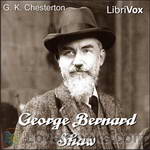 George Bernard Shaw
George Bernard Shaw
Chesterton and Shaw were famous friends and enjoyed their arguments and discussions. Although rarely in agreement, they both maintained good-will towards and respect for each other. However, in his writing, Chesterton expressed himself very plainly on where they differed and why. In Heretics he writes of Shaw: “After belabouring a great many people for a great many years for being unprogressive, Mr. Shaw has discovered, with characteristic sense, that it is very doubtful whether any existing human being with two legs can be progressive at all... | |
 Manalive
Manalive
The flying blast struck London just where it scales the northern heights, terrace above terrace, as precipitous as Edinburgh. It was round about this place that some poet, probably drunk, looked up astonished at all those streets gone skywards, and (thinking vaguely of glaciers and roped mountaineers) gave it the name of Swiss Cottage, which it has never been able to shake off. At some stage of those heights a terrace of tall gray houses, mostly empty and almost as desolate as the Grampians, curved... | |
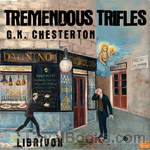 Tremendous Trifles
Tremendous Trifles
“None of us think enough of these things on which the eye rests. But don’t let us let the eye rest. Why should the eye be so lazy? Let us exercise the eye until it learns to see startling facts that run across the landscape as plain as a painted fence. Let us be ocular athletes. Let us learn to write essays on a stray cat or a coloured cloud. I have attempted some such thing in what follows; but anyone else may do it better, if anyone else will only try. ” (Gilbert Keith Chesterton) | |
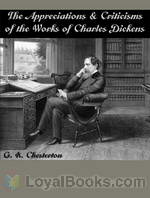 The Appreciations and Criticisms of the Works of Charles Dickens
The Appreciations and Criticisms of the Works of Charles Dickens
“These papers were originally published as prefaces to the separate books of Dickens in one of the most extensive of those cheap libraries of the classics which are one of the real improvements of recent times. Thus they were harmless, being diluted by, or rather drowned in Dickens. My scrap of theory was a mere dry biscuit to be taken with the grand tawny port of great English comedy; and by most people it was not taken at all–like the biscuit. Nevertheless the essays were not in intention so aimless as they appear in fact... | |
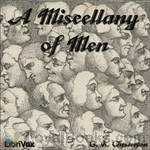 A Miscellany of Men
A Miscellany of Men
Gilbert Keith Chesterton was among the world’s most prolific writers who incorporated relentless logic, wonderful humor, and a clear view of truth into an amazing tool for exposing the foolishness of the policies of the world around him through the device of paradox.It is always great fun, and certainly always a learning experience to read Chesterton. A Miscellany of Men may be his hardest work to define, as it deals with a huge array of issues, using “personal types” as illustration. It would... | |
 The Trees of Pride
The Trees of Pride
Three trees, known as the Peacock trees, are blamed by the peasants for the fever that has killed many. Squire Vane scoffs at this legend as superstition. To prove them wrong, once and for all, he takes a bet to spend the night in the trees. In the morning he has vanished. Is he dead, and if so who has killed him? The poet? The lawyer? The woodsman? The trees? | |
 Robert Browning
Robert Browning
There is an old anecdote, probably apocryphal, which describes how a feminine admirer wrote to Browning asking him for the meaning of one of his darker poems, and received the following reply: “When that poem was written, two people knew what it meant–God and Robert Browning. And now God only knows what it means. | |
 Magic: A Fantastic Comedy
Magic: A Fantastic Comedy
| |
 The Victorian Age in Literature
The Victorian Age in Literature
| |